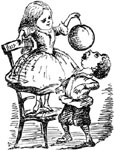
Mixed Marriages: Breeding Grounds for Religious Indifferentism?
SPIRITUALLY SINGLE PARENTHOOD
This year marks the 60th anniversary of the premiere of Jerome Robbins’s hit musical Fiddler on the Roof. The play, initially shelved for being “too Jewish,” began its run in Detroit before moving to Broadway, where it stayed for years, underwent revivals, and was adapted into a movie in 1971 (with famed Israeli actor Chaim Topol in the lead role of Tevye in place of Zero Mostel, who starred in the play). It is the story of an impoverished dairyman and his family who live around the turn of the 20th century in the Pale of Settlement, that (progressively shrunken) zone on the peripheries of the Russian Empire into which Jews were steadily driven as the result of pogroms. Fiddler’s songs are as memorable as its characters: Tevye, the poor dairyman who wishes he were a rich man and who argues with a God to whom he is ultimately obedient; his wife, Golda; and three of their daughters, Tzeitel, Hodel, and Chava. I suspect that when most people think of Fiddler, they see images from the film version.
Much of the action in the film centers around the three daughters and their marriages. Tevye and Golda usher their girls into adulthood, fully assuming they will have arranged marriages — perhaps brokered by the village matchmaker — and hoping they will be good ones, considering their dowries would be poor. The young women, however, have other ideas. Though Tzeitel might have been matched with a much older widower, the village butcher, she loves Motel, a poor-as-a-synagogue-mouse tailor. Hodel, meanwhile, is attracted to Perchik, a revolutionary Jew who happened to visit Anatevka, their shtetl, or village. He is eventually arrested for his revolutionary activity and sent to Siberia, where Hodel — in a haunting song to her father — says, “I must go. I must go.” Chava comes to marry Fyedka, a young man of the village who happens to be Russian Orthodox.
Each “match” is a trial for Tevye. Tzeitel, the oldest, breaks the pattern of the parentally arranged and approved unions common — and expected — among their kinfolk. When Tzeitel and Motel announce that they have “made a pledge” to marry, Tevye’s first musical reaction is “unheard of! Absurd!” But, in the end, he relents and thereby introduces a comedic subplot of how to break off the arranged engagement with the butcher.
At least Motel is a known commodity, the little boy at play — and in synagogue — in Anatevka. He shares Tevye’s family’s life and values. Yes, Perchik is a Jew, too, but he is a secular Jew, a revolutionary, maybe even an atheist. He comes from outside the shtetl. Still, in the film version of Tzeitel’s wedding scene, Perchik and Hodel look at each other, Hodel singing as she reflects on her sister’s marriage, “Is there a canopy” — a Jewish marriage beneath a chuppah — “in store for me?”
You May Also Enjoy
Not long after the same-sex marriage battles have begun we are beginning to hear promotion of polygamy, three-parent laws, and even talk of legal incest.
Invent your own ceremony, write your own vows, and ordain your own minister.
Contemporary film is quite advanced; the tools are available for making significant films. What is obviously lacking is insight.

